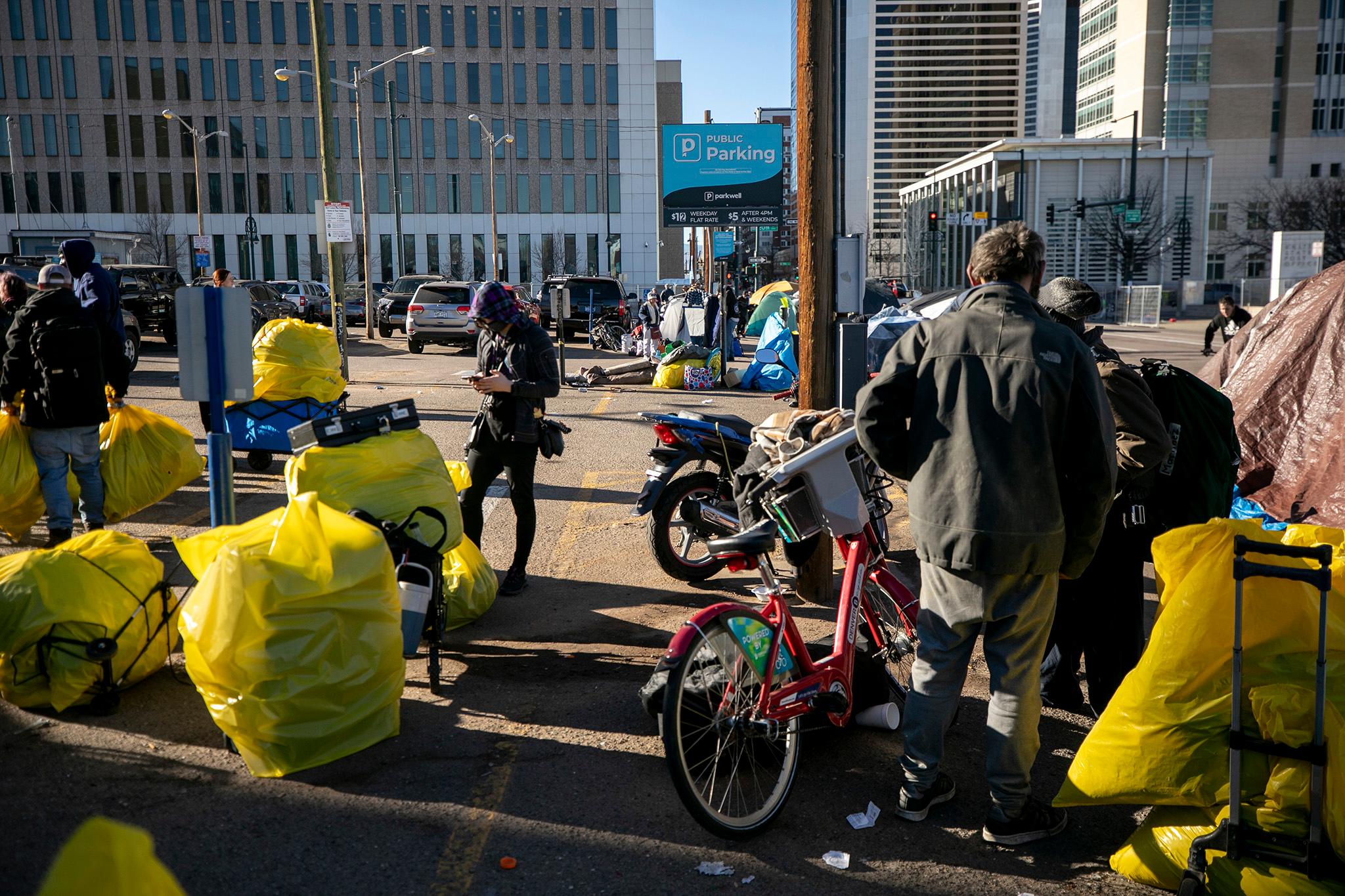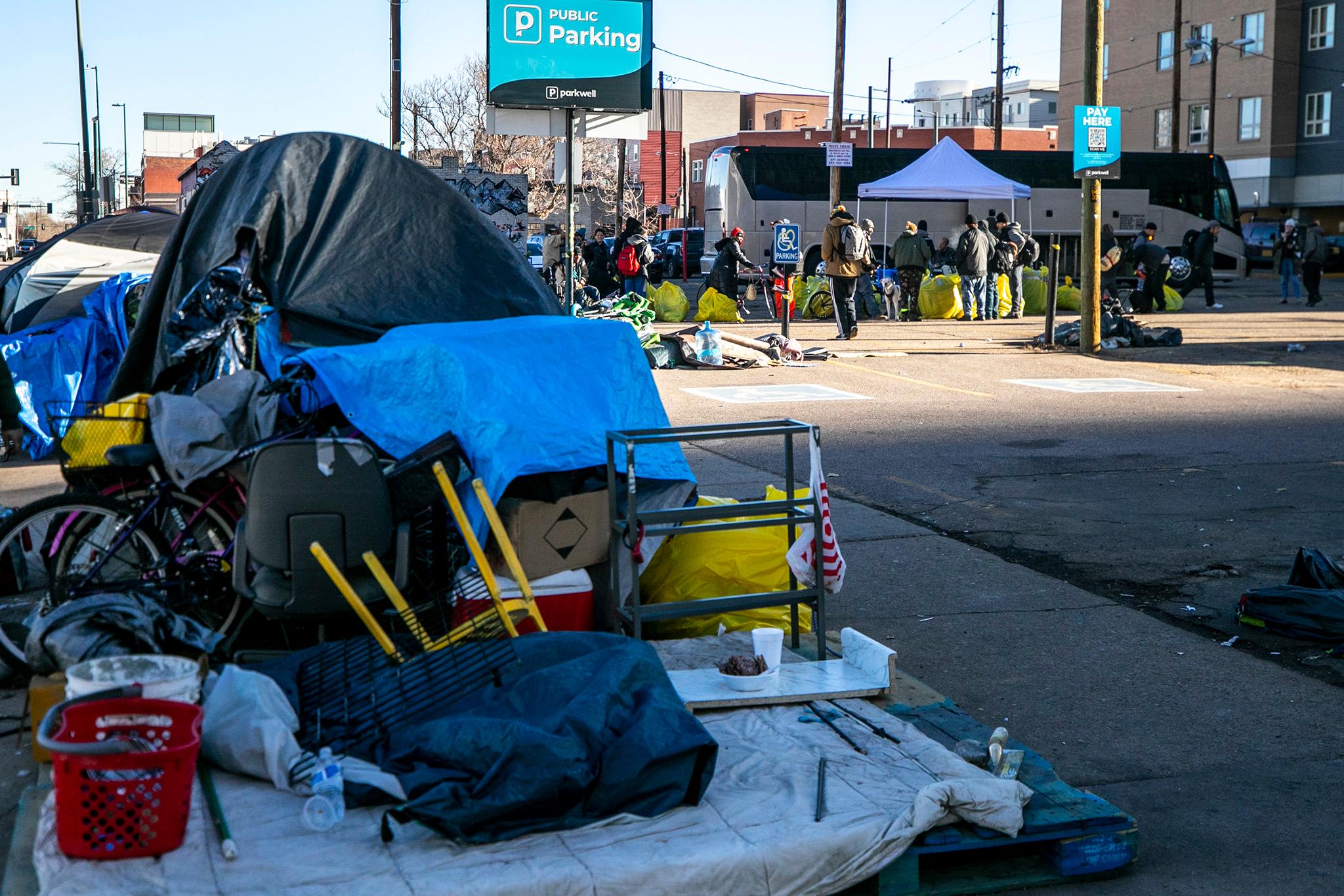The encampment at 20th and Curtis Streets was busy on Thursday morning, as people living on the streets packed belongings into bright yellow bags and boarded a bus for one of the hotels the city has converted into non-congregate shelter space.
Many people were on their way to something they have not had in months, if not years: a roof over their head and a door that locked.
"I'm ready, I've been out here eight years," one person said as they packed up their belongings. "It's way past time."
Thursday's encampment enclosure was the fourth undertaken by Mayor Mike Johnston's administration, which has moved fast to open converted hotels and micro-community sites for people sleeping on the streets, with the goal of moving 1,000 people indoors by the end of 2023.
That number has hit 317 according to the city dashboard, and is expected to surpass 500 in the next two weeks as the city closes the Curtis St. encampment, along with another camp at 48th Avenue and Colorado Boulevard.
"We are delighted to celebrate a major step forward in our mission to bring Denverites out of homelessness and hopelessness and into housing and hope," Johnston said at a press conference on Thursday. "Today represents a major step in that effort."

People getting ready to move off the streets on Thursday expressed a mix of fear and hope as they packed up their belongings.
Amber Causer said she felt scared and nervous -- she has lived on the streets for three years, while her husband has experienced homelessness for 16 years. Their relationship was part of the reason they lived on the streets, as many shelters segregate by gender.
"It's something new. I'm used to being out here, being outside, and so it's something new to be inside," she said. "It's scary, but it's an achievement too for me because I've been looking for this for a long time."
Causer said the encampment closure felt different from the sweeps that happened under former Mayor Michael Hancock's administration. Those sweeps - some of which have also continued under Johnston's leadership - moved people from place to place without anywhere to go. Thursday's encampment closure similarly featured police and city staff, but also included a bus to short-term housing.
"When I first was here, it was three days and then they're like, 'Move along,'" Causer said. This time, she was at the Curtis Street encampment for about three weeks before getting on a list to move inside.

Sarah Sjoberg said she is looking forward to moving inside, but said that she only got a few days' warning from the city and that she will have to leave behind some of her belongings. She said she would have liked more time to prepare and more bags to transport her stuff.
Sjoberg has lived on the street for about three years, at first in Nebraska and now in Denver. Like Causer, she opted for living on the streets with her husband over splitting up at different shelters.
"It's exciting. But then on the other side of it, I'm really nervous," she said as she packed up her tent.

After packing up, people living in the encampment closed Thursday will bus over to the former DoubleTree Hotel in Central Park.
That site will become "an anchor" of the city's entire homelessness response, according to Johnston. In addition to the site's 300 rooms, the converted hotel will also include case management and other support services run by the Salvation Army. The city received an approximate $24 million grant from the state to support the site.
It's one of a number of hotels and micro-community sites coming online in the next few weeks. But in other parts of the city, the Mayor's office has rolled back plans for a handful of proposed sites, citing infrastructure issues and a lack of nearby resources. Meanwhile, a number of community members have pushed back against a range of sites in their neighborhood.
"I've shared my concerns many times about concentrating poverty in historically neglected corners of our communities. And the mayor's plan to address the citywide issue by involving the whole city will ensure that this does not happen. I'm confident of that," said Councilmember Shontel Lewis, who represents District 8 including the Central Park area with the hotel and a number of other sites.
"My heart aches, knowing so many face losing limbs or even their lives as the cold continues to set in this winter," she said, "and today, I am grateful knowing that 200 Denverites in this dire position will have walls and warmth."

Johnston said the closure at Curtis Street is just the first of multiple to come in the rest of December, as the city rushes to meet its goal of sheltering 1,000 people by the end of the year.
Johnston said his staff knew a lot of this work would end up happening at the very end of the year, given the time it takes to get sites online.
The administration has faced criticism for how it is defining success in the initiative, including people who stay housed for at least 14 days. Johnston has said previously that it was possible the city might not meet its 1,000 person goal by the end of the year, but seemed hopeful on Thursday.
"I don't think that we're behind. One of the things we've learned obviously is the complexity of what it takes to build, prepare, staff, open even a single site, let alone six, seven, eight sites across the city," he said. "We think we are still on pace to be successful."
Denverite visual journalist Kevin J. Beaty contributed reporting.












